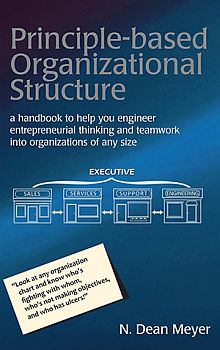Excerpt from www.NDMA.COM, © 2026 N. Dean Meyer and Associates Inc.

Analysis: Why Great People Alone Aren't Enough
why great people in a bad organizational structure will fail
by N. Dean Meyer
Some argue that structure isn't all that important, and that success depends simply on hiring and developing great people who work hard, work well together, and "do what's right" for the organization.

This line of thinking leads them to design organizational structures around the unique talents or career needs of key executives.
There are at least three reasons why this is a bad idea:
- You have to restructure the organization whenever anyone changes jobs. Otherwise, successive managers with their own unique talents will find those carefully tailored jobs impossible to fill.
Of course, each restructuring is disruptive and expensive. And since repeated reorganizations do little to improve the organization's effectiveness, they reinforce the belief that structure doesn't matter -- a self-fulfilling prophecy.
- Structures designed without consideration for the science of structure depend on leadership teams that work so well together that structure indeed doesn't matter. It requires that people look past their own job descriptions and personal interests for the good of the organization.
This altruism isn't natural; and it certainly isn't a reliable process. These organizations are fragile. They require a charismatic leader, and a tightly knit and dedicated leadership team. They generally fall apart when the executive who created the team or any of its key members leave (or just get tired).
- Designing an organization that depends on everyone being "great" is impractical.
Sure, great people are, well, great. But an organization that depends on everyone being above average is difficult to staff because you can't always afford the best, or they may not be available. Also, it's limited in its scalability because you can only hire so many super-achievers.
It's true that great people can overcome any structural problems. Well, let me be more specific.... It's possible for superior people who work well with their peers, who are motivated by an excellent leader, and who are willing to work long hours and to set aside their own best interests (and those of their staff) to do what's best for the organization, can overcome most structural dysfunctions.
But if the structure is poorly designed, an inordinate amount of leaders' time, energy, and goodwill is spent resolving confusion and friction rather than doing real work. Wouldn't you rather your great people focus their precious time and energies on achieving great things, than spend it dealing with self-imposed obstacles which can (and should) be fixed?
The truth is, great people in a bad structure will fail, or at least not perform to their potential. Here are four reasons why:
- Overlapping domains: Managers with overlapping territories are paid to compete with one another. The stronger the talent, the more intense the in-fighting.
- Conflicts of interests: A manager whose job is to keep things running and also to innovation is paid to go in two opposing directions. They may succeed at one, and fail at the other; but the right balance of opposing objectives is unlikely.
- Impossible jobs: If you expect a person to be excellent at too many different professions, he/she may be mediocre at all, or may win at one and perform poorly at the rest. People can only be world class at one thing at a time.
- Disempowerment: Manager A's job is to oversee manager B, and decide how B performs his/her work. You can't hold B accountable for results, when A is may be directing him/her to do things badly.
On the other hand, a normal bell-curve of people in a healthy structure can succeed.
Great people and a team spirit are, of course, wonderful. But they alone don't make an organization perform well. Great organizations are, by design, those where average people can succeed, and super-achievers can super-succeed.
|


